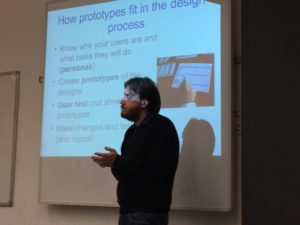Smart data hack – Innovative Learning Week 2015
On Monday 23 February, I was invited to come along to the Innovative Learning Week’s “Smart Data Hack”, hosted by the School of Informatics, to talk about prototyping.
“Smart Data Hack”
The “Smart Data Hack” was a five day event that sought to bring together students to build innovative solutions for real-world problems, encouraging them to exercise their skills in technology, analysis and design. A series of challenges (some broader than others) are set for the students, including from sponsors such as Bloomberg, Google, Microsoft, Skyscanner and Reuters, allowing the participants to exercise their skills to attempt to create real solutions.
The early part of the week centres on introducing the challenges and presenting ideas and techniques that could help the participants formulate their ideas. I was invited to give a talk about Prototyping, both in theory and in practice (using the Balsamiq tool, available on the University’s wiki service).
I’ve previously written about prototyping as a technique, so details are here if you’re new to it:
Presentation and experience
When I’ve presented on prototyping previously, my audience has tended to already be familiar with the concept and more interested in the Balsamiq tool itself, in terms of delivering rapid mockups of websites they’ve put together. I was interested that the students on the Smart Data Hack were more interested in the concept, and place of prototyping in the design process (answer: at the earliest stage possible). The participants were clearly highly technically adept, so were interested in learning about things like user experience, testing and design from a theoretical viewpoint to further their experience in the area.
Searching questions were asked, and I hope that my answers left them relaxed (yet still curious!) about such ideas, and particularly when it comes to group work with others from a less technical background. Understanding technical design concepts in words is a terrain fraught with difficulty and misunderstanding; a clear image of what a thing (or idea, or series of ideas) looks like always pays back on the time taken to sketch it many times over.
Unfortunately I didn’t have time later in the week to drop by to check on progress (or avail myself of the free food on offer) – but I’ll be checking back regularly for updates on the winners and ideas that come out of the week.


